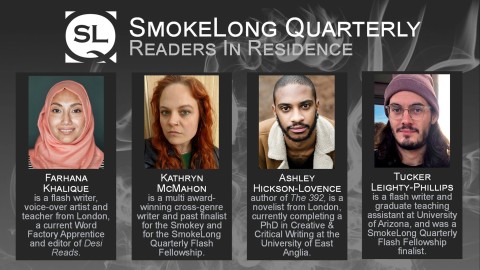
Beginning with issue 69, SmokeLong now invites experienced writers from around the world to participate in our editorial process. Below, our outgoing Readers in Residence share their thoughts and experiences of reading the SmokeLong queue, and their advice to would-be submitters.
Our immense gratitude goes out to each our first readers in residence: Ashley Hickson-Lovence, Kathryn McMahon, Farhana Khalique, and Tucker Leighty-Phillips.
Ashley Hickson-Lovence
 There’s no doubt that I’ve learned lots in my role as a SmokeLong Quarterly reader-in-residence. Until about half a year ago, as a novelist – who has sometimes dabbled with poetry in the past – I knew next to nothing about flash fiction. Here in the UK it still seems to be a rather niche – although growing – literary form for both readers and writers. However, I did witness first-hand just how popular the flash form is across the pond when I had the pleasure of attending the AWP conference in Texas, back in March this year. In sharing the SLQ table for a day or two to sell my debut The 392, I saw just how celebrated the form is by many.
There’s no doubt that I’ve learned lots in my role as a SmokeLong Quarterly reader-in-residence. Until about half a year ago, as a novelist – who has sometimes dabbled with poetry in the past – I knew next to nothing about flash fiction. Here in the UK it still seems to be a rather niche – although growing – literary form for both readers and writers. However, I did witness first-hand just how popular the flash form is across the pond when I had the pleasure of attending the AWP conference in Texas, back in March this year. In sharing the SLQ table for a day or two to sell my debut The 392, I saw just how celebrated the form is by many.
As a novelist who often agonizes about the syntactical construction of a sentence, reading very short flash narratives that have to be under 1000 words seemed to suit my style as a reader and writer. Although I’m not really a poet, in my own work I’m looking to achieve a sense of poetry in every line: alliterative, bouncy, sensory, sometimes dynamic, sometimes quietly profound. As a result, in the submissions I judged, I sought to find writers who demonstrated a finesse and flair line-by-line without overcomplicated lexical choices, that told a cohesive story that made me think about something or someone in a way I might not have done before. Easy!
It must be said that the calibre of the stories submitted was generally high. Very high. And because all entries are judged blind, it wasn’t until a final decision on the story had been made that I had access to the bio of the author behind the work. At this point, I could see that the writers ranged from students to retired teachers to MFA students to multi-award-winning novelists.
But credentials, for the most part, mean little. For me, having been part of the judging process for a few months now, the most important aspects to a successful submission are story and sentencing. Think about zooming in and zooming out; think microcosm. How does the seemingly small represent something profoundly bigger? Linguistically, a single flat or jarring sentence could be the difference between a ‘maybe’ and a ‘no’, so proofreading is obviously essential. As is editing: be assertive, don’t let the overarching story be derailed by superfluous digression or laboured metaphor; cut words that don’t need to be there, and after that…cut some more.
Most importantly: as a shy little boy, my mum used to say to me often, “If you don’t ask, you don’t get.” My advice to any writer thinking about sending their story to SLQ in the future: if you don’t submit, you’ll never know.
Farhana Khalique
 Where did the last few months go?! Being a reader-in-residence for SmokeLong Quarterly has been a dream. What an honour to be asked, and to be able to read new writing. I’d never been a reader for a journal before, so a lot of this was new to me. It was fun getting to know how things like Submittable work from ‘the other side’. Aside from voting Yes/No/Maybe and commenting on a piece, it was fascinating being able to see (and potentially argue with(!)) the other editors, too. It was also reassuring to know that there was always at least one other team member who’d read the same submissions, in case I’d missed any rough diamonds.
Where did the last few months go?! Being a reader-in-residence for SmokeLong Quarterly has been a dream. What an honour to be asked, and to be able to read new writing. I’d never been a reader for a journal before, so a lot of this was new to me. It was fun getting to know how things like Submittable work from ‘the other side’. Aside from voting Yes/No/Maybe and commenting on a piece, it was fascinating being able to see (and potentially argue with(!)) the other editors, too. It was also reassuring to know that there was always at least one other team member who’d read the same submissions, in case I’d missed any rough diamonds.
It’s been invaluable to be able to read such a range of work. It has taught me a lot about what works and doesn’t work in a flash fiction/CNF. The pieces that really stood out for me were the ones that focused on a particular idea/ related ideas and used viewpoint and language in fresh way that was also consistent with the vision of the piece. This might sound vague to someone thinking of submitting something, but as long as you’ve written a story (as opposed to a fragment, character study, ramble or rant!) and you’ve really thought about what you’re trying to say and the best language/structure for saying it, then you’re probably doing just fine. Sometimes, of course, a piece just isn’t right for a particular place. Just keep reflecting and submitting. Rejections always outweigh the acceptances for all of us—never give up!
Kathryn McMahon
 In reading submissions, one of the things that became apparent was which submitters read flash and which didn’t, as well as who was and wasn’t familiar with the work that SmokeLong publishes. This was sometimes obvious from the very first sentence! Some submissions were from writers who based their pacing on longer forms. I encountered a number where the prose was strong but read like the introduction to a novel instead of a piece that could stand alone. I also read flashes I hope to see in the world after they have been given room to breathe and evolve. I think the biggest hurdle to publishing flash can be the rush to get a story out there. Patience and time away from a piece are often the missing ingredients. I think that can also be true for subject matter that is challenging and/or traumatic. For example, I saw a lot of pieces that mentioned the pandemic in passing without anchoring it in context. While it is something we are all experiencing, that does not mean there is a uniformity of experience. Every household, community, and even state and country are handling this with differing degrees of seriousness, risk, and result. If you are going to write about the pandemic, and it is certainly worth writing about, it’s important to prevent it from becoming abstract and impersonal. Stop and notice the details. Even if the pandemic is the backdrop, the way it’s treated matters. How is the pandemic (or another catastrophic event) affecting different facets of your characters’ lives? If reading for SmokeLong reinforced anything for me, it was that while it is tempting to rely on broad, sweeping statements in flash, they often carry less impact than those punchy nuggets of detail that encapsulate personal experience and feel real and true.
In reading submissions, one of the things that became apparent was which submitters read flash and which didn’t, as well as who was and wasn’t familiar with the work that SmokeLong publishes. This was sometimes obvious from the very first sentence! Some submissions were from writers who based their pacing on longer forms. I encountered a number where the prose was strong but read like the introduction to a novel instead of a piece that could stand alone. I also read flashes I hope to see in the world after they have been given room to breathe and evolve. I think the biggest hurdle to publishing flash can be the rush to get a story out there. Patience and time away from a piece are often the missing ingredients. I think that can also be true for subject matter that is challenging and/or traumatic. For example, I saw a lot of pieces that mentioned the pandemic in passing without anchoring it in context. While it is something we are all experiencing, that does not mean there is a uniformity of experience. Every household, community, and even state and country are handling this with differing degrees of seriousness, risk, and result. If you are going to write about the pandemic, and it is certainly worth writing about, it’s important to prevent it from becoming abstract and impersonal. Stop and notice the details. Even if the pandemic is the backdrop, the way it’s treated matters. How is the pandemic (or another catastrophic event) affecting different facets of your characters’ lives? If reading for SmokeLong reinforced anything for me, it was that while it is tempting to rely on broad, sweeping statements in flash, they often carry less impact than those punchy nuggets of detail that encapsulate personal experience and feel real and true.
Tucker Leighty-Phillips
 Smokelong is a journal I hold near and dear—one of the first literary journals I ever discovered, one of the first homes of my work, honoring me as a finalist in last year’s fellowship. It’s hard not to feel a special attachment to the journal, hard to consider myself “emerging” as a writer without acknowledging that Smokelong was often the buoy pushing beneath my body.
Smokelong is a journal I hold near and dear—one of the first literary journals I ever discovered, one of the first homes of my work, honoring me as a finalist in last year’s fellowship. It’s hard not to feel a special attachment to the journal, hard to consider myself “emerging” as a writer without acknowledging that Smokelong was often the buoy pushing beneath my body.
Flash and micro fiction is my first love, and to read for a journal exclusively working in my favorite form was a little dazzling. I initially became attracted to flash while working in the service industry, reading stories on my phone during slow periods or restroom trips (thieve that time, folks!). It was a tremendous experience being able to pull the curtain and see so much wonderful contemporary flash, and to feel the tenderness and care put into each submission by the team. It felt a little like being called up to the majors, every time I commented on a piece and saw one of Smokelong’s prolific editors sharing their thoughts (I’m still trying to get a signed baseball from Nancy Au!). After spending three months on the editing side of the journal, I’m all the more convinced that a writer’s work is receiving careful attention from some of the most brilliant minds in short-form writing.

 Included in the price of SmokeLong Fitness:
Included in the price of SmokeLong Fitness: